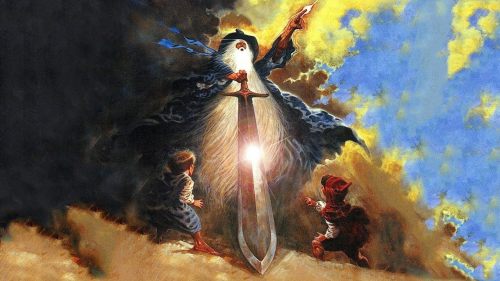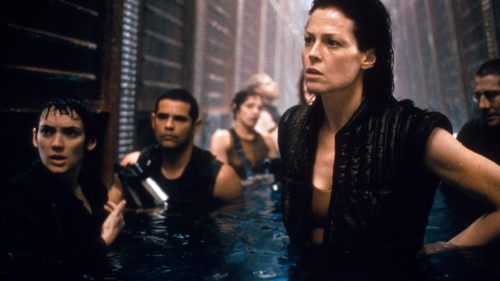Fantastic Fest: A MONSTER CALLS Is Cynical, Soulless Grief Porn
A Monster Calls is a movie about how stories and storytelling help us through hard times. In the film a young boy is coping with his mother’s impending death by cancer and he begins being visited by a giant monster who tells him tales, tales that relate to the problems and pressures he is experiencing. Because stories and storytelling help us through hard times. The monster, who is a big living yew tree, tells these tales and then sort of explains how they relate to his life and then he tells the boy that stories and storytelling help us through hard times.
That, after all, is the theme of the movie: stories and storytelling help us through hard times. And lest you not pick up on that theme screenwriter Patrick Ness, who adapted the film from his own book, makes sure to let you know, as much as possible, that stories and storytelling help us through hard times.
A more obvious piece of sentimentalist claptrap I have not seen this year, and in the hands of director JA Bayona, whose movie The Impossible was one of the more insufferable and offensive films of its own year, A Monster Calls transcends simply being obvious into being truly cloying. The film fumbles for your heartstrings like a college frat boy fumbling for a bra clasp; it’s all grabby and unsubtle and clumsy as hell. It’s a film that demands your tears, that will not take no for an answer.
What makes Bayona dangerous is that he’s a gifted visualist. A Monster Calls is wonderfully shot and framed, and he can tweak your emotions in the way a particularly manipulative TV commercial can (if you’ve ever found yourself embarrassed to be crying at a car commercial you’ll understand the emotional totalitarian level on which Bayona works). The film is saturated in a smarmy score, which does a lot of the heavy lifting. It’s the kind of movie that gives you a lot of shots of the sickly cancer patient in case you weren’t feeling the tears already, lots of shots of a young woman slowly wasting away in that glowing cinematic way that turns the ill into incandescent martyrs whose on-screen deaths ratify our own ability to feel for others. If this guy were making propaganda movies for Donald Trump we would all be fucked in the extreme.
Felicity Jones plays the dying mom, and it’s disheartening to see her do the saintly cancer patient role so early in her promising career. Her character is dying to teach her son, our protagonist, a lesson or two, and that’s about her part in the movie. Jones is fine in the role, but it’s such a stock sickly character that there is little for her to bring except mournful eyes and a Christlike forgiveness for the shitty little brat at the end of the movie.
The shitty little brat is played by Lewis MacDougall, who previously appeared in the truly atrocious Pan (which I would rewatch in a heartbeat before sitting through A Monster Calls again). McDougall is good in all the ways he needs to be good - he’s big and broad in his pain and anguish and he throws fits and he cries and pouts and all that. There were moments where I truly liked the kid, but he’s too often being directed to be too big.
Sigourney Weaver also appears, wielding an accent that is as tenuous as a ghost you sight out of the corner of your eye. She’s fine, and maybe it’s a sign of my own advancing age that I often felt for her more than I did for the kid, who is whining and demanding and almost breathtakingly self-centered. This kid was raised badly, and I wanted Sigourney’s stern (occasionally) English mum to give him a good spanking.
I know, I know, he’s reacting badly because his mom is dying. Believe me, I get it. The movie leaves you no room to miss this point. Every element of the movie, from character to theme, is relentlessly slammed into your face. Even when the movie should sort of let up with the screaming obviousness - during the animated moments when Big Tree tells his stories - the connections between the fiction and the kid’s real life is staggeringly obvious. This is a movie made for the cheap seats, and it’s just bellowing its message all the way to the folks in the back. Don’t worry - no living human being with any brain activity at all will be able to miss the message of this movie, which is that stories and storytelling help us get through tough times.
It’s a worthy theme. I love it. I just wish it wasn’t being ground into my face like broken glass. Because the movie is so insistent Bayona doesn’t allow there to be one organic moment, not one emotional note that is hit gently or with art. The film is relentless and phony, a milking machine constructed to extract human tears.
There is one aspect of the theme that truly worked for me, but it was a meta aspect. The voice of Big Tree is provided by Liam Neeson, who famously went through his own period of loss and grief when his wife, Natasha Richardson, died in an accident seven years ago. Neeson’s voice is recognizable, even through layers of electronic fiddling, and hearing him talk about grief and loss (again, there’s no metaphors here - this shit is just plainly spoken, again and again) carries a real weight, especially as the loss being examined in this film is the loss of a younger person, the ending of a life that should have had more time. It’s important to remember that while A Monster Calls is unsubtle in what it says, its essential messages are true.
Still, it’s hard not to react negatively to a film as calculated and cynical as this one. A Monster Calls is a soulless exercise in grief porn, a movie that wants to make you feel something and that is willing to pummel the living shit out of you to get a reaction. I’m someone who cries at the drop of a hat (don’t get me started on the beautiful heroism of rescue dogs… I feel myself tearing up right now thinking of their selflessness) and I’m proud to say that I sat dry-eyed through A Monster Calls, no matter how many bamboo shoots Bayano shoved under my toe nails.



